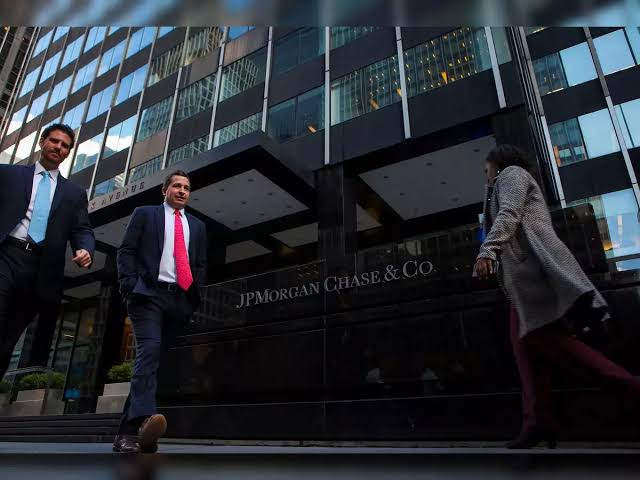JP Morgan warns US recession risk rising under Trump trade policies

In a stark warning to markets and policymakers alike, JP Morgan has raised alarms about the possibility of a recession in the United States in 2025, attributing the risk primarily to President Donald Trump’s aggressive trade policies.
According to the investment bank’s chief global economist, Bruce Kasman, there is now a 40% chance that the US could slip into a recession next year, with the potential for even greater economic consequences if Trump’s proposed tariffs on key trading partners come into full effect.
Kasman’s remarks, made during a press briefing in Singapore on March 12, underscore the growing uncertainty surrounding the US economy as the consequences of Trump’s trade tactics start to unfold.
JPMorgan’s warning is an echo of broader concerns that Trump’s protectionist stance could harm the economic trajectory of the US in the coming months. Kasman, who initially pegged the recession risk at 30% at the start of the year, indicated that the risk of a downturn has increased as Trump’s trade policies become more pronounced.
The possibility of tariffs escalating as planned, particularly the reciprocal tariffs on countries like China, Canada, and Mexico, has sparked unease in both financial markets and the global economy.
At the heart of JPMorgan’s warning is the growing expectation that Trump’s sweeping tariff measures could stifle global trade and undermine US economic growth. The tariffs, particularly the 25% duties on steel and aluminum imports that went into effect on March 12, have already drawn responses from the European Union and Canada, which imposed their own retaliatory tariffs in response.
The steel and aluminum tariffs are just a fraction of the broader trade measures that Trump has proposed as part of his “America First” agenda, which seeks to reduce the US trade deficit and encourage domestic manufacturing.
However, these tariff measures could have unintended consequences. By imposing tariffs on imports, the US risks alienating key trading partners, many of whom are critical to the global supply chain.
For instance, the US is deeply integrated into global supply chains, and higher tariffs could disrupt these systems, making American goods more expensive abroad and foreign goods more expensive domestically.
In addition, the imposition of tariffs could lead to trade wars, which might escalate into broader geopolitical tensions, further complicating international relations.
Trump’s trade policies have already rattled financial markets, as investors struggle to gauge whether the tariff hikes are part of a long-term strategy or merely negotiating tactics.
The market volatility has been exacerbated by concerns that these tariffs might not be temporary and could mark a shift in how the US engages with the global economy.
Kasman’s comments reflect these worries, noting that while JP Morgan has not yet revised its growth projections for 2025, the bank has heightened its concerns about the economic outlook.
The chances of a recession in the US have been a topic of growing debate among economists in recent months. In his latest remarks, Kasman raised the likelihood of a downturn, suggesting that there is a 40% chance of a recession in 2025. If the proposed tariffs take full effect, that risk could rise to over 50%.
This marks a significant shift from earlier in the year, when Kasman had estimated a 30% recession risk. While these numbers may still seem modest compared to the outright certainty of an economic collapse, they point to a mounting level of caution in financial circles regarding the US economy’s trajectory.
The tariff measures, coupled with other factors such as rising debt levels and ongoing geopolitical instability, could ultimately weigh heavily on US growth. Kasman pointed out that despite the heightened risk, JPMorgan’s forecast for US GDP growth in 2025 remains at 2%, though this figure has yet to be adjusted in light of the changing economic landscape.
Other financial institutions have taken a more pessimistic view. Goldman Sachs and Morgan Stanley have already revised their growth projections down to 1.7% and 1.5%, respectively, for this year, suggesting that the US economy may be facing a more sluggish recovery than previously anticipated.
The tension between Trump’s economic policies and the broader global trade environment is not just limited to the US While the administration has framed its tariffs as a necessary step to protect American interests, particularly in key industries like steel, aluminum, and automotive manufacturing, the global response has been mixed.
On the one hand, there is concern that these trade policies couldignite retaliatory measures from other nations, escalating into a full-scale trade war.
On the other hand, some analysts argue that Trump’s policies may lead to short-term economic pain but could eventually lead to a reshuffling of the global trade order that benefits US businesses in the long run.
However, the immediate implications of these policies could be far more detrimental than beneficial. Trump’s decision to raise tariffs on imports from Mexico, Canada, and China has already created ripple effects in the markets.
For instance, the stock market has been volatile in recent weeks, as investors remain uncertain about the long-term effects of these policy changes.
This uncertainty is particularly concerning as the US stock market is a key indicator of investor confidence and overall economic health.
When markets are rattled, consumer and business sentiment tends to follow suit, leading to a slowdown in economic activity.
While the US economy is the primary focus of these concerns, the impact of Trump’s trade policies is likely to extend far beyond US borders. Countries like China, Canada, and Mexico are deeply integrated into global supply chains with the US and could suffer economically from the tariff measures.
The threat of reciprocal tariffs has already led to tensions with these nations, some of whom have vowed to retaliate in kind. The longer this trade war drags on, the greater the risk of widespread economic disruption, particularly for industries reliant on international trade and global cooperation.
Furthermore, the potential rise in US tariffs could signal a shift toward more protectionist policies in other parts of the world. If other nations follow Trump’s lead in implementing reciprocal tariffs, the global trading system could experience a severe disruption, which could slow economic growth across the world.
This, in turn, could have negative repercussions for US businesses and consumers, many of whom rely on global markets to source goods and materials.
JPMorgan’s warning about the heightened risk of a US recession in 2025 serves as a stark reminder of the potential economic consequences of Trump’s trade policies.
With escalating tariffs and the threat of a broader trade war, the US economy faces a growing level of uncertainty, which could dampen investor confidence and slow growth.
While the full impact of Trump’s policies remains to be seen, the current outlook suggests that the US economy could face a difficult year ahead, with recession risks rising if tariffs continue to escalate.
As global tensions rise and economic uncertainty deepens, the road ahead for the US may be much more precarious than many had anticipated.




